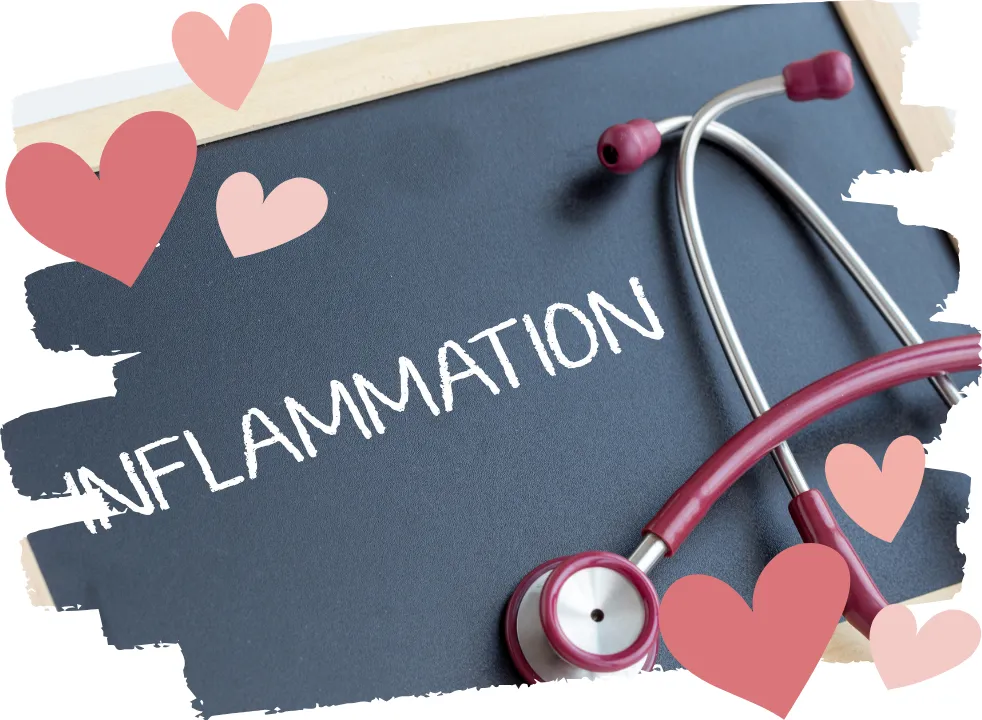The Blog
Physical Symptoms & Solutions
Welcome to the land of hot flashes, hair thinning, joint pain, bloating that makes you look six months pregnant—and yes, the stubborn weight gain that laughs in the face of your old diet tricks. This is where we break down the physical side of perimenopause with real solutions, hormone-savvy strategies, and a reminder that your body isn’t broken—it’s just asking for a new kind of care.

The Inflammation Storm of Perimenopause: Why You're Bloated, Foggy, and Fired Up (Literally)
✨ Perimenopause Power Guide: 5 Simple Nutrition Shifts to Help You Feel Like Yourself Again✨
Grab your free guide today!
👉 Download Now!
The Inflammation Storm of Perimenopause: Why You're Bloated, Foggy, and Fired Up (Literally)
"With estrogen out of the picture, stress hormones, such as cortisol, and other proinflammatory actors become more active and destructive - so much so that researchers have labeled the menopause transition as an 'inflammatory event'." ~ Dr. Mary Clare Haver, MD, The New Menopause
One day, you wake up feeling like you ran a marathon in your sleep—but all you did was toss and turn, sweat through your pajamas, and maybe snap at your partner for breathing too loud. Your joints ache, your brain feels like it's wrapped in fog, and your waistband is suspiciously snug—even though nothing in your routine has changed.
What gives?
This, my friend, is perimenopausal inflammation in action. Thanks to hormonal shifts (looking at you, estrogen), your body loses one of its fiercest anti-inflammatory allies. The result? A simmering storm of chronic inflammation that can leave you feeling like a stranger in your own skin.
But here’s the thing: you can calm the fire. Once you understand what’s going on under the hood, you can start making small, mighty changes that make a big difference.
What Even Is Perimenopausal Inflammation?
Inflammation isn’t all bad. In fact, your body uses it as a defense mechanism when you’re injured or fighting off invaders. That’s acute inflammation—the helpful kind. But chronic inflammation? That’s a whole other beast. Left unchecked, it can quietly stoke the flames of heart disease, diabetes, brain fog, and more.
During your reproductive years, estrogen is like your body's internal firefighter. It helps:
Suppress pro-inflammatory cytokines (the stuff that makes things red, swollen, and painful)
Boost antioxidant pathways that neutralize damage from stress and pollution
Support mitochondrial function (hello, energy production!)
But in perimenopause, estrogen starts to fluctuate—and eventually drops like it’s ghosting your metabolism. Without that steady hormonal support, inflammation takes the wheel. Pro-inflammatory markers like CRP, IL-6, and TNF-α spike, increasing your risk for:
🔥 Osteoporosis – Inflammation speeds up bone loss.
🔥 Heart Disease – Damaged arteries + plaque = trouble.
🔥 Insulin Resistance & Weight Gain – Inflammation messes with blood sugar control.
🔥 Brain Fog & Mood Swings – Inflammatory cytokines mess with neurotransmitters.
🔥 Muscle Loss (aka Sarcopenia) – Less muscle = more inflammation.
So yeah, you’re not just “getting older”—your biology is literally changing the game.
How to Reduce Inflammation and Actually Feel Like Yourself Again
Here’s how to go from inflamed and foggy to fired up and fabulous:
🥦 1. Eat to Fight Inflammation (at the Cellular Level)
Your fork? It's a power tool. What you eat either fans the flames or calms them down.
Anti-Inflammatory MVPs:
Polyphenol-Rich Foods – Think berries, pomegranates, green tea, and dark chocolate (yes, please!)
Cruciferous Veggies – Broccoli, kale, and cabbage support detox and hormone balance.
Omega-3s – Salmon, sardines, flaxseeds = inflammation-fighting gold.
Healthy Fats – Avocados, olive oil, nuts, seeds.
Spices That Slay – Turmeric, ginger, and cinnamon aren’t just tasty—they’re inflammation regulators.
Limit These Inflammatory Frenemies:
Processed junk and sugar bombs
Alcohol (yep, even that nightly “just one”)
Refined carbs and seed oils (like soybean, corn, and canola)
🏋️♀️ 2. Strength Train to Shrink Inflammation
Muscle is magic. It’s anti-inflammatory, hormone-loving, and metabolism-boosting. And during perimenopause? You’re losing it faster than you think.
Why It Works:
Lowers inflammatory markers (like TNF-α)
Improves insulin sensitivity and burns belly fat
Increases BDNF (a brain-loving compound that boosts mood and memory)
And no, you don’t have to live in the gym. Bodyweight squats, resistance bands, or lifting soup cans totally count. Start where you are—just move.
😴 3. Sleep: Your Secret Weapon Against Inflammation
Your body does major repair work while you sleep. But perimenopause sleep? Ha. Cue the 3 a.m. wakeups, night sweats, and racing thoughts.
Tips for Better Zzz’s:
Magnesium Glycinate – Helps relax muscles and quiet the mind.
Ditch the Screens – Blue light messes with melatonin. Unplug 1–2 hours before bed.
Cool, Dark Cave Vibes – 65°F is the sweet spot.
Let’s be real: getting great sleep during perimenopause is like catching a unicorn. But every little tweak adds up.
🧘♀️ 4. Lower Stress, Lower Inflammation
Cortisol isn’t evil—but when it’s high all the time (hello, midlife stress), it keeps inflammation on a loop.
Simple Ways to Chill:
Meditation or breathwork (even 5 minutes helps)
Walking in nature (science says 20 minutes lowers cortisol)
Gratitude journaling (it’s not just woo—it reduces inflammation too)
💊 5. HT: Your Anti-Inflammatory Ally?
Hormone therapy isn’t for everyone—but for some, it’s a game-changer.
How It Can Help:
Reduces CRP and IL-6 (key inflammation markers)
Supports cardiovascular health and bone density
Lowers brain inflammation and improves mental clarity
Curious if it’s for you? Talk to a provider who actually knows hormones—not just a one-size-fits-all approach. (P.S. If your doctor spends 5 minutes with you and heads for the door mid-sentence, it might be time to shop around.)
Reclaim Your Health: Small Shifts, Big Results
Perimenopause might feel like a full-body betrayal some days—but it’s not the end of the story. It’s the beginning of a new chapter where you get to show up for yourself in powerful ways.
💥 Start with one thing:
✅ Swap your cereal for a protein-packed smoothie.
✅ Add a quick strength session to your week.
✅ Take your sleep seriously—no more doom scrolling.
You’re not broken. You’re inflamed—and that can change.
Because midlife isn’t just about surviving.
It’s about freaking thriving. ✨
Hormonally yours,
Kimberlee Erin
Just a heads-up: I’m a Certified Menopause Coaching Specialist and Holistic Nutritionist, and while I love sharing what’s worked for me and my clients, this blog is for informational purposes only. It’s not a substitute for medical advice. Always check in with your healthcare provider before starting new supplements, hormones, or treatments—especially since every woman’s perimenopause journey is different. You deserve personalized care that truly fits you.
Free Download
Embracing Perimenopause: Tips and Tools for a Smooth Transition
Feeling overwhelmed by perimenopause? You’re not alone. Get my free guide, "Embracing Perimenopause: Tips and Tools for a Smooth Transition," and gain the confidence to manage your symptoms effectively.
Packed with practical advice and expert tips, this guide will help you balance your hormones, reduce stress, and improve your well-being.
Download your copy today and start your journey towards a smoother, more empowered transition.

